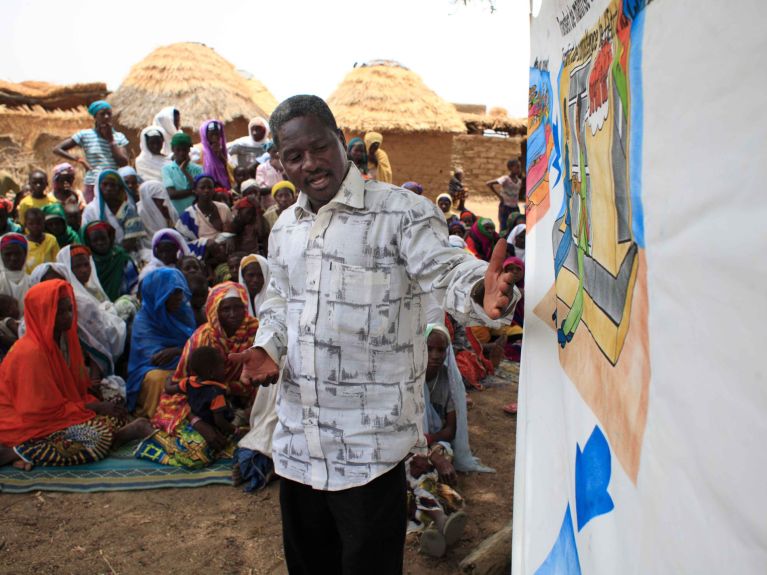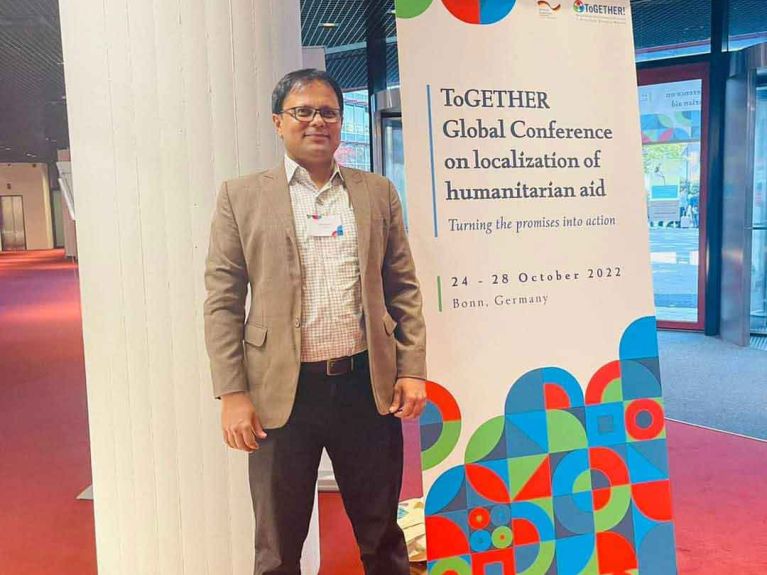ToGETHER makes emergency aid better
How to organise humanitarian assistance efficiently – international helpers explain how a German programme supports their work.

Since March 2020, Caritas Germany, Welthungerhilfe, Diakonie Katastrophenhilfe and Malteser International have been running a special programme aimed at strengthening local organisations in the area of humanitarian assistance. It is currently active in eight countries – Ethiopia, Bangladesh, the Democratic Republic of the Congo, Indonesia, Colombia, Myanmar, Pakistan and Somalia. In total, 38 local organisations are involved. Named “Towards Greater Effectiveness and Timeliness in Humanitarian Emergency Response”, or ToGETHER for short, the programme is supported by Germany’s Federal Foreign Office.
We asked helpers in many parts of the world about their experiences of ToGETHER:

Maira Vanesa Mendoza
Project coordinator at the Secretariado Nacional de Pastoral Social (SNPS) in Colombia
“As a Caritas Colombia organisation, we are committed to issues such as humanity, sustainability, equality and solidarity. With the support of the ToGETHER programme, we have significantly improved the emergency aid we provide by developing a forward-looking approach that involves early warning systems and risk management. This enables us to respond more quickly in an emergency. We have also optimised our administrative and technical processes and our project management, for example. In our view, the localisation approach is particularly useful in humanitarian assistance, and we are committed at all levels to making it more visible internationally.”

Keumala Devi
Director of the Center for Child Study and Protection (PKPA) in Indonesia
“The PKPA is committed to protecting children in many regions of the country and works to strengthen at-risk groups in society, above all women. Our work in crises is especially important because those groups that are at risk in any case then require particular protection. We had our first missions when Aceh was hit by the earthquake and tsunami in 2004. In humanitarian missions such as this, rapid response times and the scope of the aid provided play a crucial role – both can be achieved only if humanitarian assistance is localised.
The Indonesian government has recognised and promoted the important role of local actors - but local organisations must be further supported. In this context, we are helped by the ToGETHER programme, which puts us in touch with donors and international partners in the area of humanitarian assistance. We can network globally, share our knowledge, take part in the international discourse on an equal footing and evaluate our work. All of this ultimately raises the profile of at-risk groups and ensures better protection.”

De-Joseph Kakisingi
National director at Santé et Développement (SAD) in the Democratic Republic of the Congo
“We work in the areas of emergency aid, health and nutrition, food security, prevention and reduction of the risks associated with natural disasters. In addition, we are committed to prevention and to providing comprehensive support to the victims of sexual violence, and are active in the area of development cooperation. With the aid of the ToGETHER programme, we identified our weaknesses and set up a programme to boost our infrastructural, logistical and financial resources.
ToGETHER enables our staff to learn from others and adopt international standards. In early May 2023, the South Kivu region was hit by heavy rainfall that led to severe flooding and landslides and devastated villages. We played a leading role in tackling this humanitarian crisis in Kalehe: We organised the rapid deployment of expert assessors, mobilised initial financial resources and led the response to the crisis. ToGETHER played an important part in this.”

Shahid Ali
Director of the Fast Rural Development Program (FRDP) in Pakistan
“Our NGO is active in areas such as water, sanitation and hygiene, food security, education and health. The FRDP commenced its work in the first week of the catastrophic flooding in Pakistan in August 2022. We were supported by HOIFA, a pool fund developed by ToGETHER. We were one of the first NGOs to respond to the emergency and joined forces with other NGOs. In this way, we were able to support a total of 500,000 people in need.
The ToGETHER programme gives us as a local partner a voice - we do more than simply implement measures decided by others. We are able to contribute our views and our cultural context and to take independent decisions ourselves – I have never experienced this kind of cooperation before. As a result of our lobbying, the FRDP was voted onto the governing board of the Core Humanitarian Standard Alliance in 2022. In addition, we took part for example in meetings and discussions with Germany’s Federal Foreign Office and Federal Ministry for Economic Cooperation and Development. This gives us the opportunity to engage in exchange and be actively involved in decision-making.“


